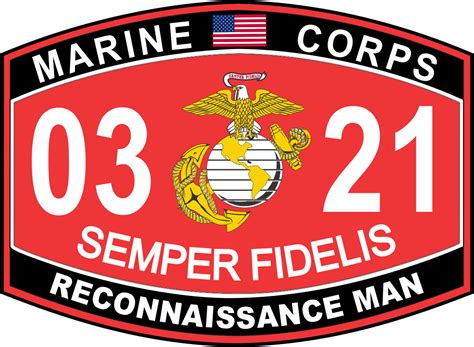0321 Usmc: Definition & Becoming A Reconnaissance Marine

Are you interested in becoming a Reconnaissance Marine? If so, you’ve come to the right place. In this article, we will discuss what it means to be a 0321 USMC (United States Marine Corps) and the steps you need to take to become one. Let’s dive in!
What is a 0321 USMC?
A 0321 USMC, also known as a Reconnaissance Marine, is a highly skilled and specialized member of the United States Marine Corps. Reconnaissance Marines are responsible for gathering intelligence, conducting surveillance, and performing other high-risk missions behind enemy lines. They are trained to operate in small teams and are often the first to gather critical information in combat zones.
Becoming a Reconnaissance Marine
1. Meet the Basic Requirements
Before you can become a Reconnaissance Marine, you must meet the basic requirements to join the United States Marine Corps. These requirements include being a U.S. citizen or resident alien, being between the ages of 17 and 29, having a high school diploma or equivalent, and passing the Armed Services Vocational Aptitude Battery (ASVAB) test.
2. Enlist in the Marine Corps
The next step is to enlist in the Marine Corps. You can do this by visiting your local Marine Corps Recruiting Office and speaking with a recruiter. They will guide you through the enlistment process and provide you with the necessary paperwork. Once you have completed the enlistment process, you will attend Basic Training, also known as Boot Camp.
3. Complete Basic Training
Basic Training is where you will learn the basic skills and knowledge required to become a Marine. During this intense 13-week program, you will undergo physical training, weapons training, and learn about Marine Corps values and traditions. It is important to excel in Basic Training as it sets the foundation for your military career.
4. Volunteer for the Reconnaissance Field
After completing Basic Training, you will have the opportunity to volunteer for the Reconnaissance field. This is a highly competitive process, and not all recruits will be accepted. However, if you demonstrate the necessary physical fitness, mental aptitude, and determination, you may be selected for further training as a Reconnaissance Marine.
5. Complete the Basic Reconnaissance Course
If you are selected for the Reconnaissance field, you will be required to complete the Basic Reconnaissance Course (BRC). This course is designed to train Marines in the skills necessary to conduct reconnaissance operations. It includes training in amphibious operations, patrolling techniques, surveillance, and intelligence gathering.
6. Specialize in a Reconnaissance MOS
Upon successful completion of the Basic Reconnaissance Course, you will be assigned a Military Occupational Specialty (MOS) within the Reconnaissance field. This could include roles such as Reconnaissance Man, Reconnaissance Team Leader, or Reconnaissance Special Amphibious Reconnaissance Corpsman (SARC).
7. Further Training and Advancement
Once you have specialized in a Reconnaissance MOS, there are opportunities for further training and advancement within the field. This may include attending additional courses, such as the Advanced Reconnaissance Course (ARC), and gaining experience through deployments and missions.
8. Maintain Physical Fitness and Readiness
As a Reconnaissance Marine, it is crucial to maintain a high level of physical fitness and readiness. This includes regular physical training, staying up to date with current tactics and procedures, and continuously honing your skills. The Reconnaissance field demands a high level of physical and mental endurance, so it is important to stay in peak condition.
9. Embrace the Marine Corps Values
Being a Reconnaissance Marine means upholding the core values of the Marine Corps: honor, courage, and commitment. These values guide every Marine’s actions and decisions, and they are especially important in the high-stakes world of reconnaissance. Embrace these values and strive to embody them in everything you do.
10. Seek Opportunities for Growth and Leadership
Finally, as a Reconnaissance Marine, it is important to seek opportunities for growth and leadership. Take advantage of the training and experiences available to you, and strive to become a respected and effective leader within your unit. The Reconnaissance field offers many opportunities for personal and professional development, so make the most of them.
Conclusion
Becoming a Reconnaissance Marine is a challenging and rewarding path within the United States Marine Corps. It requires dedication, physical fitness, mental toughness, and a commitment to excellence. By following the steps outlined in this article, you can set yourself on the path to becoming a 0321 USMC and joining the elite ranks of Reconnaissance Marines.
Frequently Asked Questions
- What is the difference between a Reconnaissance Marine and a regular Marine?
- What are the physical requirements to become a Reconnaissance Marine?
- Is being a Reconnaissance Marine dangerous?
- Can women become Reconnaissance Marines?
- What is the career progression for a Reconnaissance Marine?
A Reconnaissance Marine is a specialized role within the Marine Corps that focuses on gathering intelligence and conducting surveillance missions. Regular Marines perform a wide range of duties and may not have the same level of specialized training as Reconnaissance Marines.
Becoming a Reconnaissance Marine requires a high level of physical fitness. The specific requirements may vary, but generally, you will need to meet the Marine Corps’ physical fitness standards, which include running, pull-ups, sit-ups, and a timed swim.
Yes, being a Reconnaissance Marine can be dangerous. Reconnaissance Marines often operate in high-risk environments and may be exposed to enemy fire and other hazards. It is important to understand and accept the risks associated with the role.
Yes, women can become Reconnaissance Marines. The Marine Corps recently opened all combat roles to women, including those in the Reconnaissance field. However, the physical requirements and training standards are the same for both men and women.
After completing the Basic Reconnaissance Course and specializing in a Reconnaissance MOS, there are opportunities for further training and advancement within the field. This may include attending advanced courses, such as the Advanced Reconnaissance Course, and gaining experience through deployments and missions.
